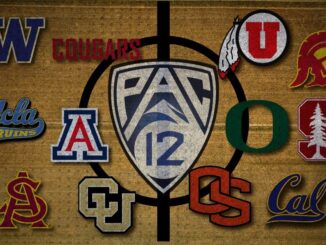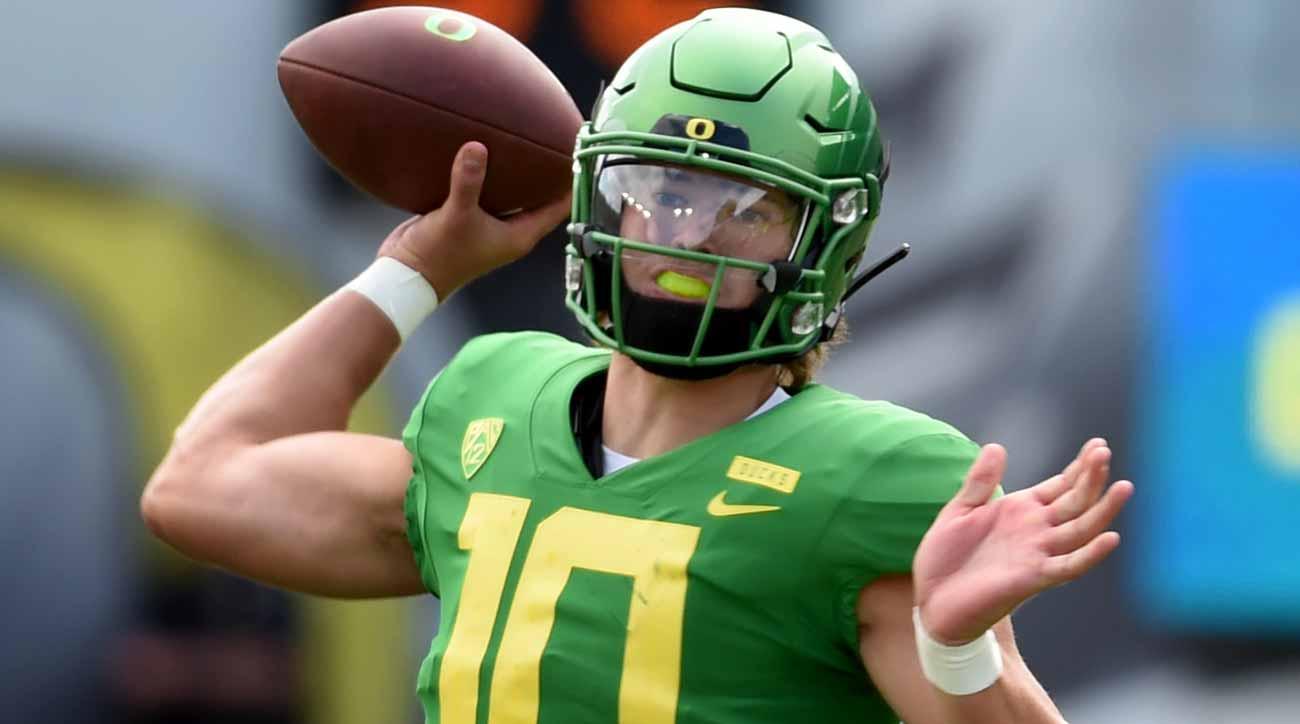
Every Thursday during the football season our writers bring you previews and predictions for each of the Pac-12 football games. Ten teams are engaged in Conference play this week. Two have byes.
USC (3-1, 4-3) at Colorado (1-3, 3-4)
Friday, October 25
6:00 p.m. PT, ESPN2
Folsom Field, Boulder, CO
Straight-Up: USC in a Blowout Win
Against the Spread: USC (-13.5)
By Ian McCollam
What the Trojans Must Do to Win
The Trojans have weathered a parade of injuries, transitioning through three quarterbacks to find poised freshman Kedon Slovis. Now USC has gone through several running backs as well, including Markese Stepp, discovering yet another star in true freshman speedster Kenan Christon. Replacement linebacker Kana’i Mauga has also stepped up, recording a game-high 13 tackles last week against Arizona. USC will need another stellar performance from Mauga and others with safety Talanoa Hufanga and defensive end Drake Jackson out. The good news is the Trojans face a comparably banged-up Buffs team, which can’t begin to match USC’s depth. Given Colorado’s recent struggles, the Trojans mostly just need to not beat themselves. The primary culprits have been penalties and turnovers: USC committed 100 yards worth of infractions against the Wildcats, and rank last in the Conference in turnover margin at -5. With Oregon visiting the Coliseum in two weeks, the Trojans must stay focused on the job at hand in what could be a potential trap game.
What the Buffaloes Must Do to Win
The Buffs have lost so many players to injuries—and the transfer portal—that the distinction between “starter” and “backup” has been rendered meaningless. The player Colorado most expected to count on this season, quarterback Steven Montez, has floundered, throwing six interceptions with only two touchdown passes over the past two weeks. The fifth-year senior needs to shake off the nightmares of the Oregon and WSU games and play loose. His offensive line has been a bright spot, as has the play of running back Alex Fontenot, who has rushed for 568 yards. Colorado’s defense, which has given up 40 points in two straight games, must hold USC under its 30.7 per game average. The inconsistent Buffalo secondary needs to slow USC’s deep receiving group, led by Michael Pittman Jr. That may sound like Mission Impossible, with Colorado’s defense ranking 116th nationally in points allowed at 34.9, but upsets happen. CU’s best hope may be to create turnovers, an area in which the Trojans have proven susceptible.
What Happens on the Field
With both teams hit hard by injuries, USC’s superior depth and talent will tilt the game in Troy’s favor. Slovis will connect with his talented receivers virtually at will, exploiting Colorado’s secondary with long passing strikes. Christon will bust through for a couple of scores or more, and the Trojans will take an early lead, without looking back. Montez will have a better day passing for the Buffs, with wideout Tony Brown due for a big game. But neither their connection nor Fontenot’s continued success will keep pace with an onslaught of USC scores. The Trojans win big, handing Colorado its third-straight blowout loss.
Notes: USC leads the series 13-0, dating back to 1927. USC’s 13-game run is their current longest streak against a Pac-12 foe. USC coach Clay Helton is 23-3 at the Coliseum. At 8,625 career passing yards, Montez trails only Sefo Liufau, the all-time Colorado passing leader, with 9,746. Alex Fontenot recorded his second career 100-yard rushing game last week. Christon scored his first career touchdown en route to his first career 100-yard game. CU’s Jack Shutack made his first career start, and is the first player to start as a walk-on since Ryan Moeller at Oregon in 2014. CB Dorian Hewett became the sixth true freshman to start a game for USC.
Arizona (2-2, 4-3) at Stanford (2-3, 3-4)
Saturday, October 26
12:30 p.m. PT, Pac-12 Network
Stanford Stadium, Palo Alto, CA
Straight-Up: Arizona in a Close Win
Against the Spread: Arizona (-1)
By Dane Miller
What the Wildcats Must Do to Win
Whoever starts at quarterback for Arizona, whether it’s Khalil Tate or Grant Gunnell, must handle pressure, make accurate throws, and avoid interceptions. The Wildcats need to feature J.J. Taylor, putting him in favorable situations that maximize his speed and elusiveness, while using Nathan Tilford or Gary Brightwell as change-of-pace backs. Noel Mazzone may want to utilize double-running back sets to keep the Stanford defense guessing. Receivers Tayvian Cunningham and Brian Casteel need to be involved on throws across the middle and on the edges, creating and exploiting mismatches. Defensively, the Cats must improve on the 469.6 yards they’ve been allowing per game. Specifically, linebackers Tony Fields II and Colin Schooler need to limit the effectiveness of Stanford running back Cameron Scarlett, and Wildcat defensive backs must make tackles in space.
What the Cardinal Must Do to Win
Stanford needs to move the ball consistently against a shaky Arizona defense, shortening the game, and minimizing empty possessions, while also avoiding turnovers. With both David Mills and K.J. Costello questionable to return, third-string quarterback Jack West will be pressed to make plays, though he is unlikely to make a significant jump. Look for the Cardinal to rely heavily on the run and play-action passes, with Scarlett carrying the offense on his back. Stanford must control the time of possession with long, sustained drives. An effective rushing attack will make it easier for West to find open receivers over the top for chunk passing plays. On defense, the Tree must bring heavy pressure on Arizona’s signal caller, forcing him to make quick decisions, while also limiting the run. The Cardinal need to overwhelm the Wildcats’ offensive line with active pre-snap movements and linebacker blitzes. The corners can probably be left in one-to-one battles with the Wildcat wide receivers, who have not proven themselves capable of taking advantage of such isolation.
What Happens on the Field
With question marks at quarterback for both teams, it’s anybody guess what happens on Saturday. But assuming Mills and Costello are unable to go, the Cardinal will struggle to pass. They’ll run the ball effectively, however, limiting Arizona’s possessions, and keeping the scoring low. Defensively, the Wildcats will manage to hold the Cardinal to several field goal attempts, doing just enough damage to determine the outcome of the game. With all the injuries Stanford have been dealt, the Wildcats will engineer a late fourth-quarter touchdown drive and win by a touchdown or less.
Notes: Stanford leads the all-time series 16-14, holding a slim 8-7 advantage at home. This will be only the fifth match-up between the schools since the Conference expanded in 2011. The Cardinal have won 10 of the last 13 in the series, including the last five by an average of 24 points. The Wildcats haven’t won in Palo Alto since 2006. Arizona cornerback Lorenzo Burns ranks 14th in the nation with 1.43 pass breakups per game. Fields II has started 32 consecutive games for the Wildcats, logging double-digit tackles in 13 of those games. Stanford hasn’t started three different quarterbacks since 1974. The Tree has started four true freshmen on the offensive line. Arizona is second in the Pac-12 in total offense, rushing yards per game, and passing yards per game.
#24 Arizona State (2-2, 5-2) at UCLA (2-2, 2-5)
Saturday, October 26
4:30 p.m. PT, Pac-12 Network
Rose Bowl, Pasadena, CA
Straight-Up Pick: Arizona State in a Close Win
Against the Spread: Arizona State (-3.5)
By Andrew Corbett
What the Sun Devils Must Do to Win
Freshman quarterback Jayden Daniels needs to hurt the Bruins with his feet as well as through the air, exploiting UCLA’s vulnerability against dual-threat quarterbacks. Getting running back Eno Benjamin going, both as a receiver out of the backfield and rushing the ball, will prove vital to ASU’s offensive success. Defensively, Arizona State has given up just 18.1 points per game, and needs to keep a potent Bruin offense under three touchdowns. That will require a big game from safety Aashari Croswell, who has logged 24 solo tackles and forced three turnovers. The Devils must deal with the threat of three capable runners in UCLA quarterback Dorian Thompson-Robinson, and running backs Joshua Kelley and Demetric Felton. If ASU can contain them, defending the pass shouldn’t be too difficult.
What the Bruins Must Do to Win
The Bruin defense needs to build on its seven-sack performance of last week. Granted, that total was inflated by a make-shift offensive line blocking for a freshman quarterback in his first start, but it gave UCLA’s defensive line a much-needed boost. The Bruins also played their corners close to the line for much of the game, rattling Jack West. UCLA needs to replicate that strategy against ASU freshman quarterback Jayden Daniels, flushing him out of the pocket, and pressuring him into making errant throws. That should help in limiting Benjamin as well. Offensively, Kelley finally appears to be back in peak form after rushing for over 170 yards against the Cardinal. The Bruins need to ride him and Felton, who have combined for 669 yards rushing this season, as far as they can take them, opening up plays for Thompson-Robinson.
What Happens on the Field
Arizona State’s defense will contain the Bruins through the air, while limiting them on the ground, putting up just enough points to grind out a victory. Unlike many ASU-UCLA games in recent memory, this one will be relatively low-scoring—somewhere in the high 20s—with the Sun Devils winning by a touchdown or less. UCLA will struggle to throw the ball effectively in the face of pressure from ASU’s defensive line, but will find success rushing the ball, pounding it in for two or three scores. Still, it won’t be enough to overcome Arizona State in Pasadena.
Notes: UCLA leads the all time series, 20-14-1, but the teams have split the last six games at the Rose Bowl. The Bruins are still looking for their first home victory of the season, having dropped the last four. Two long-standing ASU streaks ended last week: A 125-game streak of scoring more than 10 points, and a 140-game streak of scoring at least seven points. The Devils had not scored less than three points since being shut out in 2008. UCLA has won two or more road games for the first time since 2015. The Bruins held Stanford to 198 yards of offense last week, the lowest allowed since 2009.
California (1-3, 4-3) at #12 Utah (3-1, 6-1)
Saturday, October 26
7:00 p.m. PT, FS1
Rice-Eccles Stadium, Salt Lake City, UT
Straight-Up: Utah in a Blowout Win
Against the Spread: Utah (-21.5)
By Kamron Azemika
What the Golden Bears Must Do to Win
Having lost three straight, the Bears find themselves in the center of a perfect storm, facing a must-win game against No. 12 Utah in Salt Lake City, without a proven quarterback. Whether it’s transfer Devon Modster or freshman Spencer Brasch starting, Cal must exceed its 194 average passing yards to keep pace with the Utes. The Bears also need to get Christopher Brown Jr. going, after the sophomore running back averaged a scant 48 yards over the past two games. Defensively, Cal is capable of keeping Utah within the 18.7 points it has been allowing opponents per contest, even with Ute quarterback Tyler Huntley good to go. But even if the Bears are able to make Utah one-dimensional, it won’t be easy to keep running back Zack Moss in check. A stellar defensive effort won’t keep the Utes out of the end zone, putting a struggling Bear offense in the position of having to score above its 19.9-point average against one of the best defenses in the nation.
What the Utes Must Do to Win
Utah need only shut down Cal’s limping offense to take control of the contest. With a defense ranked second in the nation against the rush and 30th against the pass, that’s a likely outcome. The Utes are allowing just 11.7 points per game, sixth-best in the FBS, and are likely to keep the Bears under that total, especially after holding the Sun Devils to just three points last week. Offensively, Utah is averaging 32.9 points per game, but rarely needs that much to win. While the Utes are capable of explosion plays through the air and on the ground, they’re content to burn time off the clock with sustained drives. A healthy Moss, who averages 6.6 yards per carry, makes stringing together first downs an easier task. Plus Huntley is always a threat to connect with receiver Bryan Thompson, or scramble. More of the same will be more than enough this week against Cal.
What Happens on the Field
Whichever quarterback starts for Cal, he won’t be able to keep his jersey clean against Utah’s defensive front, succumbing to pressure more often than not. The Bears won’t have much luck on the ground, either, though Brown is sure to make a dent here or there. The Utes will shorten the game with its steady running attack, folding in an occasional long gain, while keeping Cal possessions short and ineffective. The Bear defense won’t be able to hold Utah under three touchdowns, and that should be plenty to secure the win. Cal’s offense won’t score more than once.
Notes: Cal leads the all-time series 6-5, having won the last meeting 28-23 in 2016. The teams have split the four games since Utah joined the Conference, but the Utes hold a 3-1 advantage over the Bears in Salt Lake City. Cal has held 14 straight opponents under 25 points, the longest active streak in the country. This is the first time Utah has started a season 6-1 since 2016. After his 21-tackle performance last week, Bear linebacker Evan Weaver has now logged 17 career double-digit tackle games, and continues to lead the nation in solo tackles. Utah’s defense has allowed just 30 second-half points in the first seven games. Moss leads the Conference in rushing touchdowns with eight.
Washington State (1-3, 4-3) at #11 Oregon (4-0, 6-1)
Saturday, October 26
7:30 p.m. PT, ESPN
Autzen Stadium, Eugene, OR
Straight-Up: Oregon in a Close Win
Against the Spread: Washington State (-14)
By Nicholas Bartlett and Jace McKinney
What the Cougars Must Do to Win
Above all, the Cougars need to play with confidence and trust their system. Wazzu’s offense has more firepower than its 4-3 record indicates, though it has yet to prevail against a quality defense, falling to ASU and Utah. Oregon presents a similar challenge, with big-and-fast pass rushers, quality linebackers, and a strong stable of defensive backs. Cougar quarterback Gordon needs to avoid interceptions and keep Max Borghi involved, freeing up wideouts Easop Winston and Dezmon Patmon downfield for deep balls. On defense, WSU needs to force turnovers and limit Oregon’s run attack while pressuring UO quarterback Justin Herbert. In short, the Cougs need to make Herbert beat them with his arm, rather than give up long touchdown drives that melt the clock and keep WSU’s prolific offense off the field. The Cougs need the game to be high scoring, frenetic, and unpredictable to upset Oregon.
What the Ducks Must Do to Win
This is a dangerous matchup for Oregon, coming off their biggest win of the season against Washington. WSU’s explosive passing offense poses special challenges for any defense. The Duck unit stands out this season, but may still allow a couple quick Cougar scores before adjusting. Oregon has the horses to keep up in a shootout, as they did in Seattle, but would prefer to control the tempo, wearing down Wazzu with the run. The Duck offensive line should be able to give Herbert enough time to exploit WSU’s thin secondary, while also opening up lanes for CJ Verdell, Travis Dye, and Cyrus Habibi-Likio against a Cougar defense that is allowing 438 yards per game. On defense, the Ducks must find ways to keep Wazzu quarterback Anthony Gordon off-balance, using stunts and blitzes to hurry his throws and flush him out of the pocket, if not sacking him. Oregon will need to account for multiple talented wideouts, and keep the majority of Gordon’s passes in front of them, while rallying to the ball.
What Happens on the Field
In what could be a trap game, the Ducks have a major advantage: WSU has beaten them four years straight, ensuring that Oregon will not overlook the Cougs. The Ducks will find success through the air early, and control the game on the ground. Oregon’s offensive line will prove too dominate for the Cougs, leading to long rushing plays that allow Herbert to capitalize on play-action passes. WSU will put up points, as always, but not enough to outscore the Ducks. With three prior losses, WSU will lack the confidence needed to finish off Oregon. This should be a close contest, but the Ducks will make the three or four crucial plays they need to win the game.
Notes: The Ducks lead the all-time series 49-42-7, but lost last year’s matchup 20-34. WSU’s four-game winning streak in the series is the longest streak by a Pac-12 foe over the Ducks since UW won five straight from 1989-93. WSU leads the country in passing yards with 441 per game. Oregon is 4-0 in Pac-12 play for the first since 2013, and enjoys a six-game winning streak for the first time since 2015. WSU has 13 takeaways, tied for second in the conference. Borghi is the first Cougar with three 100-yard games in a season since Jerome Harrison logged eight in 2005. Herbert extended his streak of games with a touchdown pass to 35, the longest in the nation.
This story was originally published at sportspac12.com. Syndicated with permission.




